10 start with P start with P
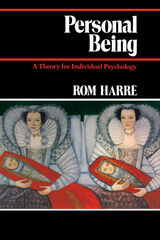
The undoubted fact of human individuality has remained outside the field of interest of scientific psychology. Neither the central organization of consciousness nor individual powers of action have been dealt with in substantial research programmes. Yet every facet of our mental lives is influenced by how our minds are organized. How much of this organization comes from the languages and social practices of the cultures into which we are born is undetermined.
In this book, Rom Harré explores the radical thesis that most of our personal being may be of social origin. Consciousness, agency and autobiography are the three unities which make up our personal being. Their origin in childhood development and their differences in different cultures are explored.
Nevertheless, despite the overwhelming influence of social environment on mental structure, individual identity is a central facet of Western culture. How is the formation of such identity possible? Rom Harré ends with the suggestion that personal identity derives from the complementary powers of human beings both to display themselves socially as unique and to create novel linguistic forms making individual thought and feeling possible.
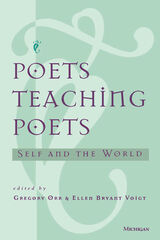

How to deal with the relationship between the individual and society as it reveals itself through politics is the large theme of these erudite and stylish essays by a leading scholar whose lifelong concerns have included political behavior, decision-making by groups, and legislative deportment. Truly interdisciplinary in his approach, Heinz Eulau has drawn on all the social sciences in his thirty years of research into the political behavior of citizens in the mass and of legislative elites at the state and local levels of government.
Utilizing a variety of social and political theories—theories of reference group behavior, social role, organization, conflict, exchange functions and purposive action—he enriches the methodology of political science while tackling substantive issues such as social class behavior in elections, public policies in American cities, the structures of city councils, and the convergence of politics and the legal system. Eulau is ranked among the few scholars who have shaped the agenda of political science, and his latest work should also prove valuable for sociologists, social psychologists, and theorists of the social sciences.
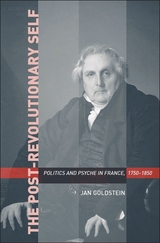
In the wake of the French Revolution, as attempts to restore political stability to France repeatedly failed, a group of concerned intellectuals identified a likely culprit: the prevalent sensationalist psychology, and especially the flimsy and fragmented self it produced. They proposed a vast, state-run pedagogical project to replace sensationalism with a new psychology that showcased an indivisible and actively willing self, or moi. As conceived and executed by Victor Cousin, a derivative philosopher but an academic entrepreneur of genius, this long-lived project singled out the male bourgeoisie for training in selfhood. Granting everyone a self in principle, Cousin and his disciples deemed workers and women incapable of the introspective finesse necessary to appropriate that self in practice.
Beginning with a fresh consideration of the place of sensationalism in the Old Regime and the French Revolution, Jan Goldstein traces a post-Revolutionary politics of selfhood that reserved the Cousinian moi for the educated elite, outraged Catholics and consigned socially marginal groups to the ministrations of phrenology. Situating the Cousinian moi between the fragmented selves of eighteenth-century sensationalism and twentieth-century Freudianism, Goldstein suggests that the resolutely unitary self of the nineteenth century was only an interlude tailored to the needs of the post-Revolutionary bourgeois order.
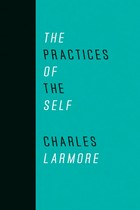
What is the nature of the fundamental relation we have to ourselves that makes each of us a self? To answer this question, Charles Larmore develops a systematic theory of the self, challenging the widespread view that the self’s defining relation to itself is to have an immediate knowledge of its own thoughts. On the contrary, Larmore maintains, our essential relation to ourselves is practical, as is clear when we consider the nature of belief and desire. For to believe or desire something consists in committing ourselves to thinking and acting in accord with the presumed truth of our belief or the presumed value of what we desire.
Larmore develops this conception with frequent reference to such classic authors as Montaigne, Stendhal, and Proust and by comparing it to other views of the self in contemporary philosophy. He also discusses the important ethical consequences of his theory of the self, arguing that it allows us to better grasp what it means to be ourselves and why self-understanding often involves self-creation.
Winner of the Académie Française’s Grand Prix de Philosophie, The Practices of the Self is that rare kind of lucid yet rigorous work that transcends disciplinary boundaries.
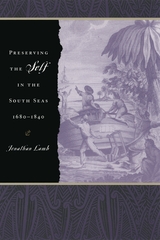
Lamb contends that European exploration of the South Seas was less confident and mindful than we have assumed. It was, instead, conducted in moods of distraction and infatuation that were hard to make sense of and difficult to narrate, and it prompted reactions among indigenous peoples that were equally passionate and irregular. Preserving the Self in the South Seas also examines these common crises of exploration in the context of a metropolitan audience that eagerly consumed narratives of the Pacific while doubting their truth. Lamb considers why these halting and incredible journals were so popular with the reading public, and suggests that they dramatized anxieties and bafflements rankling at the heart of commercial society.

In The Private Self, Arnold Modell contributes an interdisciplinary perspective in formulating a theory of the private self. A leading thinker in American psychoanalysis, Modell here studies selfhood by examining variations on the theme of the self in Freud and in the work of object relations theorists, self psychologists, and neuroscientists. Modell contends that the self is fundamentally paradoxical, in that it is at once dependent upon social affirmation and autonomous in generating itself from within. We create ourselves, he suggests, by selecting values that are endowed with private meanings.
By thinking of the unconscious as a neurophysiological process, and the self as the subject and object of its own experience, Modell is able to explain how identity can persist in the flux of consciousness. He thus offers an exciting and original perspective for our understanding of the mind and the brain.
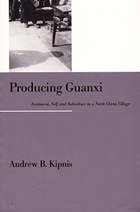
Producing Guanxi combines the theory of Pierre Bourdieu and the insights of symbolic anthropology to contest past portrayals of guanxi as either a function of Chinese political economics or an unchanging Confucian social structure. In this analysis guanxi emerges as a purposeful human effort that makes use of past cultural logics while generating new ones. By exploring the role of sentiment in the creation of self, Kipnis critiques recent theories of subjectivity for their narrow focus on language and discourse, and contributes to the anthropological discussion of comparative selfhood. Navigating a path between mainstream social science and abstract social theory, Kipnis presents a more nuanced examination of guanxi than has previously been available and contributes generally to our understanding of relationships and human action.
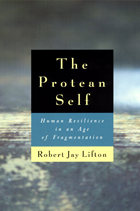
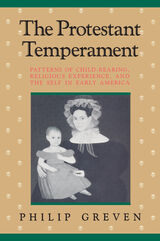
READERS
Browse our collection.
PUBLISHERS
See BiblioVault's publisher services.
STUDENT SERVICES
Files for college accessibility offices.
UChicago Accessibility Resources
home | accessibility | search | about | contact us
BiblioVault ® 2001 - 2024
The University of Chicago Press









